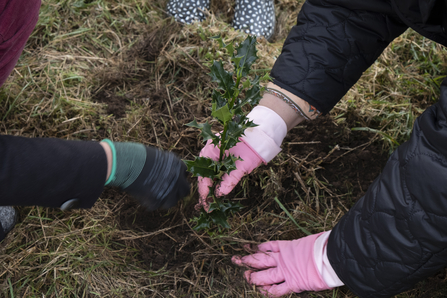
Christine Novelli Harding
Appeal: Bring beavers to Craddocks Moss

Christine Novelli Harding
What Are Nature-Based Solutions?
Nature-based solutions (or NbS for short) are interventions that work with nature, rather than against it, to address environmental, societal, and economic challenges. They involve creating, restoring, or enhancing ecosystems to provide benefits such as carbon sequestration, flood protection, urban cooling, improvements to health and wellbeing and increasing biodiversity.
We are facing several interconnected environmental challenges that NbS can help mitigate:
Flooding: Staffordshire is no stranger to flooding. At the beginning of this year, Storm Henk led to widespread flooding across the county. A predicted increase in rainfall frequency and intensity due to climate change is likely to exacerbate these events. NbS, like the restoration of wetlands and floodplains, the ‘re-wiggling’ of rivers and the planting of trees can help absorb excess water and reduce flood risks. NbS also help to improve water quality, as vegetation helps to filter out sediment and pollutants.
Climate Change Mitigation: The UK has committed to achieving net-zero carbon emissions by 2050. Nature-based solutions are pivotal in reaching this target, as healthy natural habitats can absorb and lock away incredible amounts of carbon from the atmosphere. Habitat restoration and creation, including repairing damaged peatlands, creating species-rich grasslands and large-scale tree planting schemes offer effective ways to capture and store carbon. Moreover, healthy ecosystems are essential for regulating local climates and improving air and water quality.
Urban Cooling: Temperatures in urban, built up areas can be several degrees higher than in rural surroundings. Heatwaves are predicted to become more common in future, with devastating imapcts on health. Urban NbS, such as green roofs, tree planting, and the creation of greenspaces and green walls, can help cool down urban areas, reduce energy consumption, and improve residents’ health and wellbeing.
Examples of Nature-Based Solutions in Staffordshire
Peatland Restoration
For the last six years, Staffordshire Wildlife Trust has been working to restore its largest nature reserve, The Roaches, following a devastating wildfire in 2018. During the last year over 65,000 sphagnum moss plants have been planted to restore the blanket bog habitat there. Combined with previous planting efforts this totals an impressive 687m2 (27.5 hectares) of sphagnum. Not only does healthy blanket bog lock in lots of carbon, it also slows the flow of water runoff and reduces the amount of rainwater entering streams and rivers in nearby towns and villages.
Natural Flood Management
The Trust has worked with many farmers and landowners across the county to implement Natural Flood Management schemes on their land. By using natural solutions, these projects help to alleviate flooding and also improve water quality, as well as creating wildlife habitat and increasing biodiversity. Measures include creating new storage pools, installing fallen trees and branches into streams and ditches to disrupt the flow and store water, planting trees to stabilise banks and absorb rainwater.
Economic and social benefits
The beauty of NbS lies in their multifunctionality. They not only provide environmental benefits but also generate social and economic value. NbS are often much cheaper than traditional infrastructure, and should be considered as part of a toolkit. For example, restoring wetlands to manage flood risks is far less expensive than constructing artificial barriers or drainage systems. Additionally, well-managed natural spaces can boost tourism, provide jobs, and enhance property values. There are also social benefits from restoring our natural environment. Spending time in nature is proven to improve mental and physical health.
Moving Forward
Nature-based solutions present a powerful, sustainable pathway for addressing environmental and social challenges within Staffordshire, but education is key. Ensuring decision-makers, businesses and communities understand the value of natural capital is vital.
Nature-based approaches should be integrated into both national and local plans and strategies. The role of nature, and the services or solutions it can provide, need to be considered when formulating future development plans for an area.